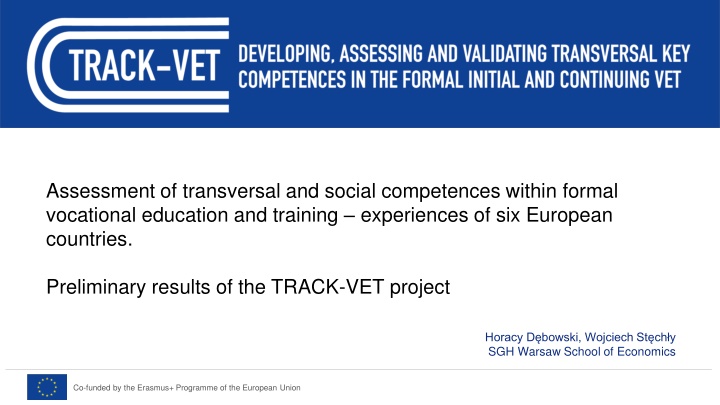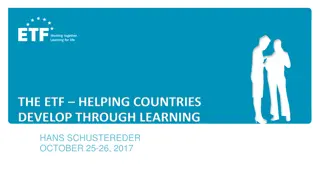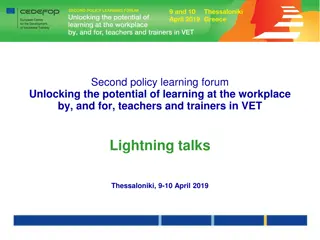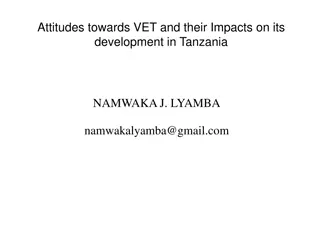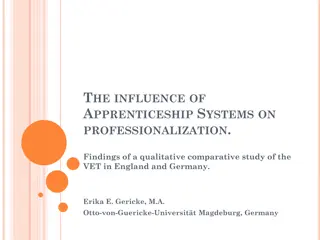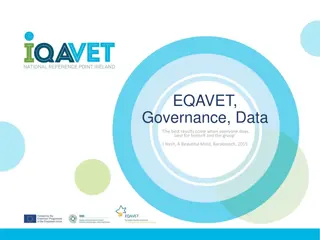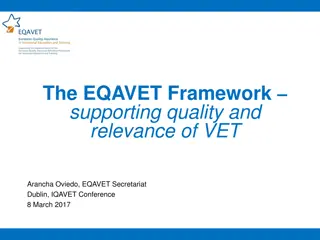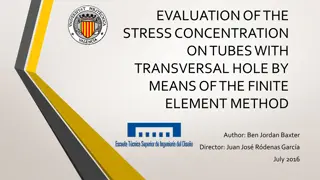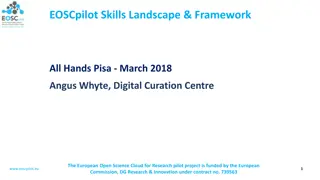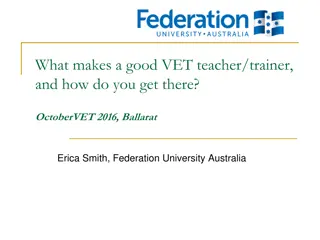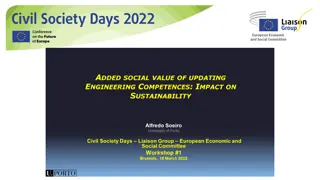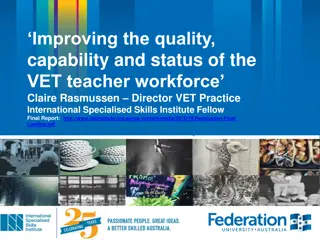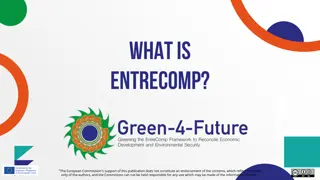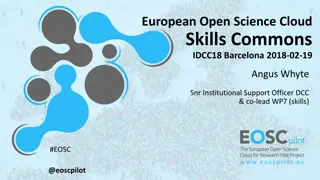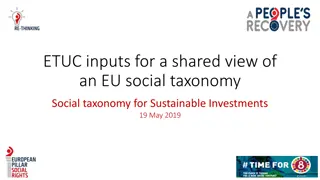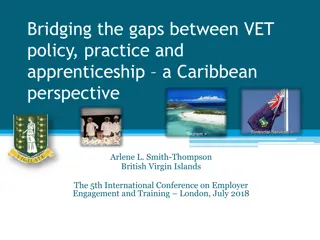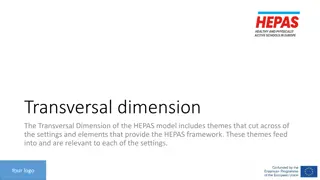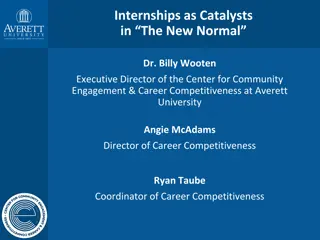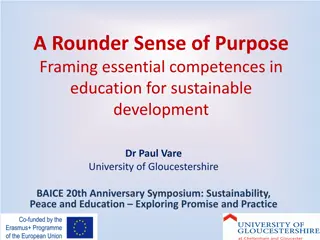Assessment of Transversal and Social Competences in European VET
Preliminary results of the TRACK-VET project focusing on assessing transversal and social competences within formal vocational education and training across six European countries. The project aims to address key competences such as personal, social, and learning competence, civic competences, entrepreneurship competence, and cultural awareness and expression competence. Through interviews with experts, country reports, and cross-reviews, the project seeks to explore solutions for developing and assessing these competences. Co-funded by the Erasmus+ Programme of the European Union.
Download Presentation

Please find below an Image/Link to download the presentation.
The content on the website is provided AS IS for your information and personal use only. It may not be sold, licensed, or shared on other websites without obtaining consent from the author.If you encounter any issues during the download, it is possible that the publisher has removed the file from their server.
You are allowed to download the files provided on this website for personal or commercial use, subject to the condition that they are used lawfully. All files are the property of their respective owners.
The content on the website is provided AS IS for your information and personal use only. It may not be sold, licensed, or shared on other websites without obtaining consent from the author.
E N D
Presentation Transcript
Assessment of transversal and social competences within formal vocational education and training experiences of six European countries. Preliminary results of the TRACK-VET project Horacy D bowski, Wojciech St ch y SGH Warsaw School of Economics Co-funded by the Erasmus+ Programme of the European Union
TRACK-VET Partnership: 1. Fafo, Institute for Labour and Social Research (Norway) 2. C req, French Centre for Research on Qualifications (France) 3. Oeibf, Austrian Institute for Research on Vocational Training (Austria) 4. VISC, National Centre for Education (Latvia) 5. SGH Warsaw School of Economics (Poland) 6. NUCEM, National Institute for Certified Educational Measurements (Slovakia) 7. UMB, Matej Bel University Bansk Bystrica (Slovakia) Co-funded by the Erasmus+ Programme of the European Union
Main rationale of the project: Although key competences including TKC are high on a policy agenda, still lots of issues related to development and especially assessment of TKC remain unsolved Co-funded by the Erasmus+ Programme of the European Union
How did we want to achieve the aims of the project? - interviews with more than 150 experts from six countries and desk research - preparing country reports of 6 European countries and cross-reviews - preparing synthesis of solutions implemented and used in European countries related to development, assessment, validation of TKC Co-funded by the Erasmus+ Programme of the European Union
In the TRACK-VET project proposal we decided to use the term transversal key competences (TKC), which is defined as a subgroup of the 8 key competences defined in the Council Recommendation on Key Competences for Lifelong Learning (2018), namely: - Personal, social and learning competence - Civic competences - Entrepreneurship competence - Cultural awareness and expression competence Co-funded by the Erasmus+ Programme of the European Union
Relation with the DASCHE project (1): The competences chosen for the TRACK-VET project can be seen as the same field of competence as DASCHE project, but relate to different level (of competences) and application contexts. TRACK-VET: mostly professional situations linked to mid-level vocational tasks and typical life situations DASCHE: lifewide social participation, high level social awareness and professional situations linked to a different set of professions Co-funded by the Erasmus+ Programme of the European Union
Relation with the DASCHE project (2): Within the TRACK-VET project we are especially interested in summative assessment, leading to validation and certification Why bother with summative assessment of TKC s? Because of the VNIL trend in VET in Europe. For learners in pathways with less analog and organized education attaining social competences may pose additional difficulties. Should the credentials / qualifications attained via VNIL be of equal value, an approach for tackling assessments linked to aspects other than knowledge and specific skills is needed. *VNIL Validation of non-formal and informal learning Co-funded by the Erasmus+ Programme of the European Union
Formal initial and continuous VET system We proposed to define formal initial and continuous VET, as systems that have some or all of the below characteristics: - based on core-curriculum or national qualification (standard); - lead to state recognised (and very often state examined and quality assured) qualifications; - be funded by the state (at least partially); - is not part of 1st or 2nd cycle in higher education. Co-funded by the Erasmus+ Programme of the European Union
Main conclusions based on the research questions (based on 150 interviews, analysis of documents, literature review) Co-funded by the Erasmus+ Programme of the European Union
1. Would descriptive categories related to competences defined in the Council of the EU adopted on key competences for lifelong learning (2018) be a useful platform in discussion between partners Answer: yes Comment: for the purpose of estabilishing a common understanding and preparing country reports TRACK-VET transversal key competences had to be operationalised Co-funded by the Erasmus+ Programme of the European Union
2. Is differentiation between professional / task specific skills and transversal (or social, or any other subcategory) competences needed. Answer: yes Comments: differentiation between professional / task specific skills and transversal (or social, or any other sub category) competences creates a false dichotomy - it is an analytical concept used to describe similar aspects of human capabilities observed in varying situations. As it turns out not using these artificial categories may in some cases (e.g. time limitation and assessment focus on specific skills) lead to incomplete development of the relevant competencies. This is especially relevant for countries in which the different concepts of competence are less used / developed. Co-funded by the Erasmus+ Programme of the European Union
3. Should TKCs (including social competences) be developed within formal vocational education? Answer: yes. Formal VET should be contributing more strongly to challenges appearing currently in European socities (immigration, radicalisation of views, developments on the labour markets). Comment: this is quite well reflected in the strategic documents and in VET core curricula Co-funded by the Erasmus+ Programme of the European Union
Presence of TKC in the strategic documents and core curricula Personal, competences learning competence social and Civic competences Entrepreneurship competence Cultural awareness and expression competence Austria X X X X France X X X X Latvia X X X X Norway X X X X Poland X X X X Slovakia X X X X Co-funded by the Erasmus+ Programme of the European Union
Austria fragments of the VET curricula: Students have the competence to: - deal with religions, cultures and ideologies, to take part in cultural life and to show understanding and respect for others - to deal with the essential question, with ethical and moral values as well as with the religious dimensions of life - to effectuate lifelong learning as immanent part of life- planning and career management Austrian country report Co-funded by the Erasmus+ Programme of the European Union
Latvia fragments of the VET strategic documents: to ensure a student with the knowledge and skills necessary for personal growth and development, civil participation, employment, social integration and continuation of education ; to promote the improvement of a student as a mentally, emotionally and physically developed personality and to develop habits of healthy lifestyle ; to promote a socially active attitude of the student, retaining and developing his or her language, ethnical and cultural particularity, as well as to improve understanding regarding the basic principles of human rights included in the Constitution of the Republic of Latvia and other legal acts to develop the student s ability to learn and improve independently, to motivate him or her for lifelong learning and an informed career . (Section 2, Regulations Regarding the State General Secondary Education Standard, Subject Standards and Sample Education programs, Cabinet Regulations No 281, 21.05.2013) Latvian country report Co-funded by the Erasmus+ Programme of the European Union
Reservation (1): - the programme documents do not provide a representation of school reality - realization of the policy-makers vision is formally expected of school principals and teachers, however the vision may be interpreted and implemented in different ways this is especially relevant for transversal key competences Co-funded by the Erasmus+ Programme of the European Union
4. Should TKC be asssessed within formal VET? With regards to formative assessment answer is yes With regards to summative assessment - no conclusive answer Based on the analysis of the six countries experiences we do not know, if this is desirable or even possible. Further analysis is needed in each case weighting the risks of reductionism ( dumbing down ), the need for elastic approach for groups and individuals and the benefits of using summative assessment and gathering experiences (experimenting) would be required. Co-funded by the Erasmus+ Programme of the European Union
4. Should TKC be asssessed within formal VET? (2) There is no formal or standalone assessment of TKCs in any of the participating countries. Continuous assessment is in project countries largely left on the discretion of teachers But leaving aside TKC outside summative assessment is considered in some countries as a danger. Co-funded by the Erasmus+ Programme of the European Union
4. Should TKC be asssessed within formal VET? (3) Assessment of TKC does not need to be incorporated into the decision what mark is assigned to the student, but maybe an oral comment on them would be of some value shifting some of the attention towards TKCs as integral part of professional skills and giving student a feedback? Co-funded by the Erasmus+ Programme of the European Union
Norway country report: In extension of this discussion we were presented with what may seem to be a dilemma: in order for TKC to be acknowledged as important in practice, it must be measurable, but if TKC is laid down in curricula in ways that make it measurable, it loses its importance as TKC. This means that it requires a reduction of TKC a type of operationalization which appears to stand in contrast to the idea of TKC Co-funded by the Erasmus+ Programme of the European Union
France country report: Generally speaking, the inspectors perceive TKCs as attitudes or behaviours which are not necessarily very objectifiable and therefore difficult to assess, except perhaps in the workplace. From this perspective, for some of them, periods of workplace training would be an appropriate situation for assessing these types of competence. Co-funded by the Erasmus+ Programme of the European Union
5. Should TKC be assessed, even to limited extent? No conclusive answer Comment: Interviewed experts within countries had different views whether assessment in limited scope, should be done or not. Examples of what limited extent might stand for just knowledge , skills not attitudes , observable behaviours in group work . Co-funded by the Erasmus+ Programme of the European Union
6. The role of employers Consensus within all country experts: employers should be involved in development of TKC No workplace socialisation without employers involvement. But the role of employers is much wider. Co-funded by the Erasmus+ Programme of the European Union
France country report: Anyway, there are some competences where the business is the best place because it s the most specific, maybe all the transversal competences where in a business people are much more vigilant, perhaps as to what is going on in collaborative and team projects and interactions between the various trades. I still think that the business world is perhaps more logical for developing those competences General inspector for industrial sciences and technology Co-funded by the Erasmus+ Programme of the European Union
Recommended actions for the policy level in VET: - Extending summative methods beyond examinations (bringing well known methods to mainstream: portfolios, projects, thesis as integral part of the grade) - Support to teachers (training and new qualifications, materials, guidelines, examples) - Developing and testing learning outcomes, assessment criteria and procedures (linked with guidance for learners and teachers) Co-funded by the Erasmus+ Programme of the European Union
Actions for the policy level in VET: - Enhancing involvement of employers - International mobilities (e.g. Erasmus+), domestic and international competitions (e.g. Worldskills) - Putting stronger focus on foundation skills (literacy, language) - Embracing a holistic perspective developing TKC s in meaningful contexts, not as a standalone competence Co-funded by the Erasmus+ Programme of the European Union
Thank you for your attention Horacy D bowski, Wojciech Stechly hdebowski@gmail.com wojciech.stechly@gmail.com Co-funded by the Erasmus+ Programme of the European Union
TRACK-VET project is funded by the Erasmus+ Programme, KA2, VET (September 2017 August 2020) Co-funded by the Erasmus+ Programme of the European Union
TRACK-VET project conference 23rd of April 2020 in Warsaw Co-funded by the Erasmus+ Programme of the European Union
